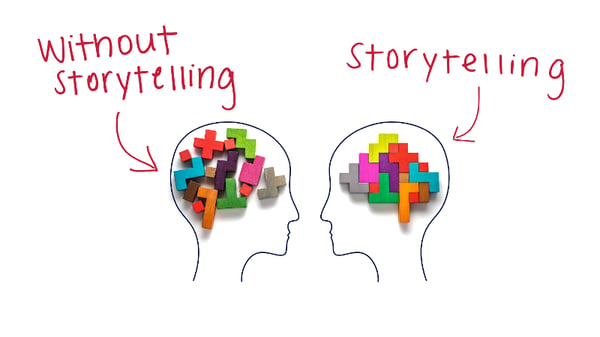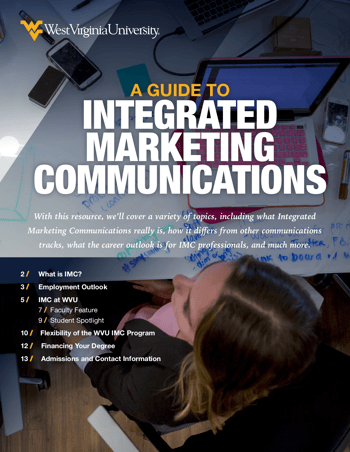
The average American is exposed to between 4,000 and 10,000 advertisements every single day. Now, if you asked anyone how many they recall seeing, it would be nowhere near that number. One marketing firm found that less than 100 advertisements make it past our “attention wall” per day.
As a marketing communications professional, it is your job to learn the science and best practices behind content marketing and branding strategies to ensure that your messages make it past your audience’s attention wall. This is where the art of storytelling marketing becomes essential.
The psychology of storytelling – what makes it effective:
For thousands of years, human beings from every known culture in the world have used storytelling as a way of documenting history, connecting with others, sharing values, and perpetuating invention. The art of storytelling continues to be a method through which humankind shares knowledge and increases connectivity — not just to each other, but to the myriad of experiences and interactions we have in our daily lives.
Stories also contain recognizable patterns, which activate our minds and influence our way of thinking. Since the human brain is built to recognize patterns, stories that include the traditional story structure — beginning, middle, and end — are especially effective when seeking to activate and elicit a response from an audience.
When we read or hear a story, our brains respond as if we are living the story out in real life. For example, if a story has action and movement in it, your motor cortex reacts just as it would if you were running at the gym. If someone is describing to you the decadent meal they just had at a new restaurant, your sensory cortex activates, allowing you to smell and even taste the food.

In short, stories are universal, and they are effective because our brains are programmed to respond to and remember the stories we’re told.
Why storytelling matters for marketing communications:
In today’s distracted and information-saturated society, marketers face a genuine challenge. Marketing professionals often struggle to connect and unify their communications across channels, and with so many media formats available today, marketers cannot afford to execute multi-channel communications that are dis-integrated, disjointed, and inconsistent. But by using the art of storytelling, marketers can help consumers make the connection between the story itself and the brand’s content, even across channels. For this reason, storytelling is perhaps the most effective vehicle for making this connection.
To craft a good story and make a meaningful connection between the brand and the customer, marketers must work backward — first getting to know their audience, then telling a story in which they can be the main character, in which the audience sees themselves. It is important to remember:
“The single most important part of your story has nothing to do with the story itself, but the audience you’re telling it to. You can have a great, well-crafted story, but if it doesn’t line up with your audience, it won’t mean a thing for your conversions.”
Four reasons storytelling is essential to the marketing communications profession:
1. Well-Told Stories Make Powerful Connections — Stories are all about human experiences. They engage our emotions and imaginations. They unite us to other people and ideals larger than ourselves. They can have the ability to connect us to a cause and to incorporate us into a brand’s mission. Storytelling contributes to the user experience within marketing, allowing the consumer to feel heard, known, and understood — all of which motivate audience engagement.
2. Storytelling is Fundamental to Information Gathering — Storytelling presents information in a structure that our brains can understand and relate to. Our brains process content by searching out the story to be found. Stories are relatable and familiar, and all humans have the intellectual framework to understand and process a message that is delivered this way. Stories help us to explain how things work and how we make and justify our decisions. By delivering your message in an easily digestible format, you will experience higher levels of audience engagement and user retention.
3. Stories Can Be More Compelling Than Data — A well-crafted, easy-to-follow story communicates your message with more impact than even the most compelling statistics could by themselves. Marketing solely driven by data can be convincing, but pairing compelling data points with a relatable story makes a connection between the head and the heart, something that is required for brand buy-in.
4. Stories Compel Audiences to Care About Your Brand — If you want your audience to consume your product or service, you must first get them to care about your brand. In the current consumer economy (and with so many options available), marketing professionals are increasingly witnessing that people don’t buy products — they buy brands. Stories are the most effective method of encouraging a consumer to invest in a brand.
Teaching Creative Storytelling in Marketing
Integrated Marketing Communications (IMC) is a discipline that adopts a human-centered approach where stories cater to an audience and where messaging is consistent across all channels of media. By utilizing a wide breadth of channels, IMC professionals are able to unify all pieces of marketing communications to connect the consumer to the brand. IMC is a strategic, collaborative, and promotional business function through which a targeted audience senses consistent, persuasive, and reinforced brand messaging.
Marketing professionals do face challenges when attempting to develop integrated marketing campaigns across media channels, but storytelling is the key ingredient in the recipe for Integrated Marketing Communications. BAnd by approaching the marketing communications industry with a story-centric strategy, marketers will better excite audiences, influence consumers, and increase their brand’s bottom line.
Integrated Marketing Communications teaches the art of storytelling:
Fueled by the academic innovation coming out of West Virginia University’s Reed College of Media, the Integrated Marketing Communications graduate program seeks to prepare both seasoned marketers, as well as aspiring marketing communications professionals with the skills needed to integrate the art of storytelling within all facets of a marketing communications campaign — from content strategy to social media, from sales to advertising, and from public relations to direct marketing.
A mixture of core courses, specialty courses, and elective courses, IMC students learn how to weave storytelling strategies into marketing campaigns by taking courses on the following:
WVU’s Integrated Marketing Communications graduate program is designed to prepare marketing communications professionals for career advancement by arming them with the sought-after skills needed to develop, refine, and implement marketing campaigns in a unified way across all channels. By equipping IMC students to use the art of storytelling in the context of marketing communications, we prepare the next generation of professional communicators for emerging and existing challenges in this dynamic, multifaceted marketing landscape.
If you’re interested in accelerating your career in this evolving field, we encourage you to contact us today.
Download A Guide to Integrated Marketing Communications to learn more about jumpstarting your career in the field of marketing communications.










